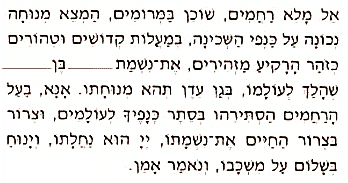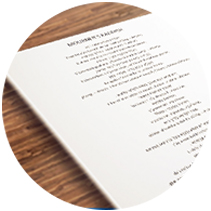

This practice developed in Babylonia where most people understood only Aramaic and sermons were given in Aramaic so Kaddish was said in the vernacular. Kaddish was not originally said by mourners, but rather by the rabbis when they finished giving sermons on Sabbath afternoons and later, when they finished studying a section of midrash or aggada.

He also says it before the Amidah at mincha, maariv, and musaf. This Kaddish is called the "Half Kaddish." Over time, the custom developed for the chazzan to say the Half Kaddish following Pesukei d'Zimra of the morning service, after the Amidah or the Tahanun and after Torah reading. The earliest version of Kaddish dates back to the time of the Second Temple. This response is central to the Kaddish and should be said out loud. The response of the listeners to the first lines of the mourners is a public declaration of the belief that God is great and holy: Yehei Shmei rabba mevorakh l'olam ul'almei almaya (May His great Name be blessed forever and ever). The opening words, yitgadal t'yitkadash, were inspired by Ezekiel 38:23 when the prophet envisions a time when God will become great in the eyes of all the nations. Kaddish is a way in which children can continue to show respect and concern for their parents even after they have died. Another explanation is that by sanctifying God's name in public, the mourners increase the merit of the deceased person. One explanation is that it is an expression of acceptance of Divine judgment and righteousness at a time when a person may easily become bitter and reject God. Although Kaddish contains no reference to death, it has become the prayer for mourners to say. It is customary for Kaddish Yatom to also be said before Psukei d'Zimra of shacharit. The Kaddish at the end of the service became designated as Kaddish Yatom or Mourner's Kaddish (literally, "Orphan's Kaddish"). The first mention of mourners saying Kaddish at the end of the service is in a thirteenth century halakhic writing called the Or Zarua. The Rabbinical Kaddish, Half Kaddish, and Whole Kaddish may be said by a chazzan (cantor - prayer leader) who is not a mourner and has both parents living. An adopted son should say it for adoptive parents who raised him. A person may say Kaddish not only for parents, but also for a child, brother, or in-law. The Mourner's Kaddish is recited for eleven months from the day of the death and also on the yahrzeit (anniversary of a death). Most religious authorities allow a daughter to say Kaddish, although she is under no religious obligation to do so. A child under the age of thirteen may say the Mourner's Kaddish if he has lost one of his parents. It is customary for all the mourners in the congregation to recite Kaddish in unison. Whether other worshippers sit or stand depends on the congregation. Kaddish is only said with a minyan (prayer quorum of ten men), following a psalm or prayer that has been said in the presence of a minyan, since the essence of the Kaddish is public sanctification. The word Kaddish means sanctification, and the prayer is a sanctification of God's name. The emotional reactions inspired by the Kaddish come from the circumstances in which it is said: it is recited at funerals and by mourners, and sons are required to say Kaddish for eleven months after the death of a parent. The Kaddish is a prayer that praises God and expresses a yearning for the establishment of God's kingdom on earth. Jewish Prayers: Table of Contents| Daily Services| Origins of Prayers


 0 kommentar(er)
0 kommentar(er)
